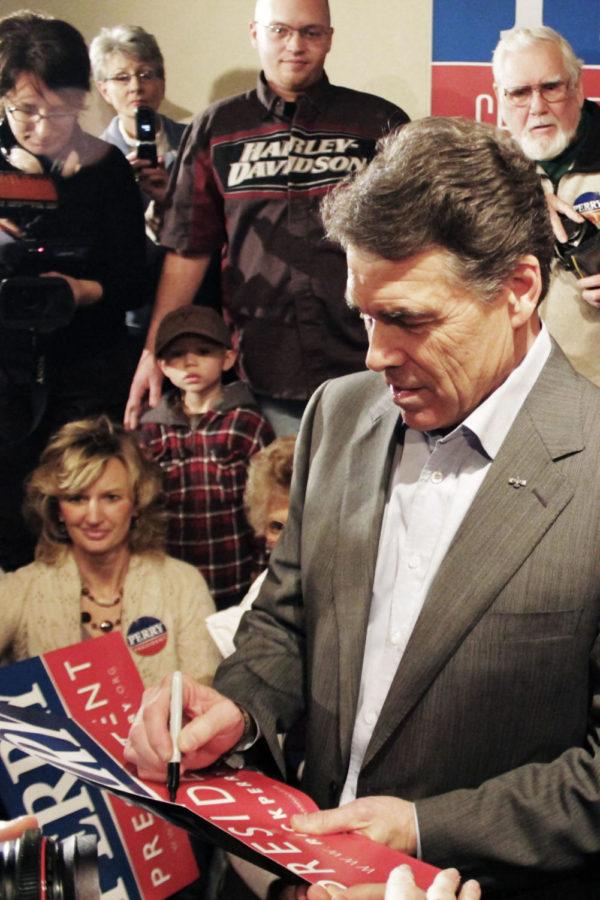Timberlake: Rick Perry vetos a bill approved 145-0
Photo: Nicole Wiegand/Iowa State Daily
Gov. Rick Perry (R-TX) signs posters and campaign signs for supporters at the conclusion of his stop at the Gigglin’ Goat restaurant in Boone on Saturday, Dec. 31.
June 12, 2013
Imagine this. In today’s political world, where people side with issues because they happen to conform with political affiliation, we can actually still achieve a rare bipartisan agreement on an issue. That too in Texas!
At the very end of May, the Texas Senate and House passed a bill called, “Buy American.” Paraphrasing, this bill stated that should a foreign good and an American good be of equal quality and of equal cost, preferential treatment would be given to the American good. It is an expansion of a law that already is in place, but in this instance, focuses on manufactured goods.
The reason? Because many Texas factories have been closing as of late due to outsourced manufacturing goods, effectively saving the state and its citizens some money but also increasing unemployment. The bill would keep money in Texas while simultaneously creating jobs.
Rick Perry, the Republican presidential candidate, happened to be one of the most boisterous when it came to the creating jobs speech. He also happens to be the governor of Texas.
This bill was passed in the Texas Senate with a vote of 23-7 and in the House with a vote of 145-0, a 97 percent legislature approval.
Gov. Rick Perry vetoed it.
You can defend Rick Perry and his intentions all you want, but it is hard to argue against a bill vetoed with 97 percent approval. This wasn’t even remotely what I consider partisan.
Can you imagine if this man was elected president? We both know he wasn’t the chosen republican candidate to run against President Obama. How has he even maintained 12 years in the Governor’s office? Gov. Rick Perry set a record number of 82 vetoes in a single session, nine fewer than President Bush did in three sessions.
Normally, you might think the end of the Buy American bill hasn’t quite happened. There is an opportunity for the House and Senate of Texas to override the veto. The veto override vote will likely take place sometime around the time of this publication and requires a two-thirds majority from both chambers. While two-thirds should easily be reached, historically only about 10 percent of vetoes get overridden due to both scheduling and a short amount of time allotted for override.
Except, contrary to what you might have heard on national networks, this won’t be possible. Texas and Montana are the only two states that only meet in the few months after an election and then never reconvene during the two year term. The Buy American bill was introduced to the governor weeks before May 27th, the day of the end of the regular session, but sat on the bill until May 25th (Memorial Day weekend). So if vetoed, the chambers could not override the veto.
How’s that for a system of checks-and-balances?







